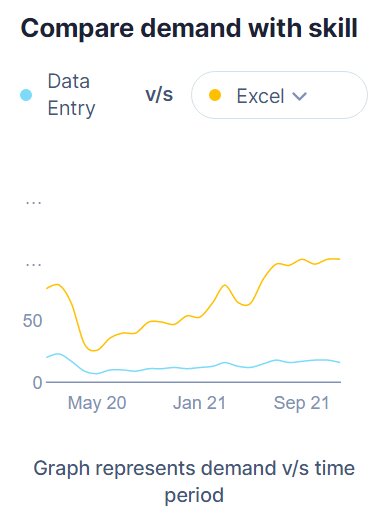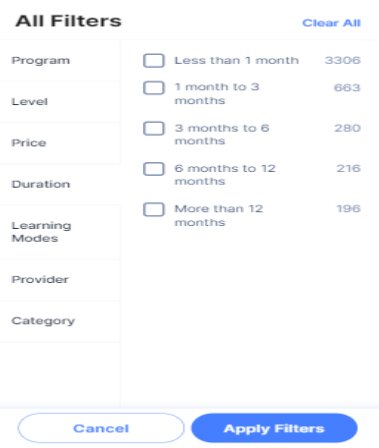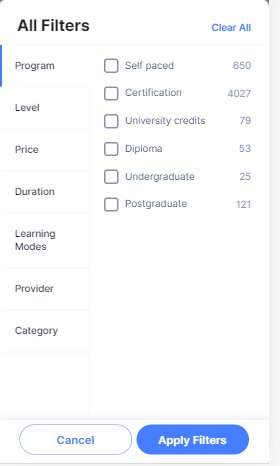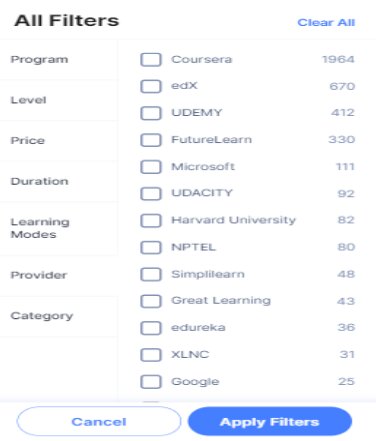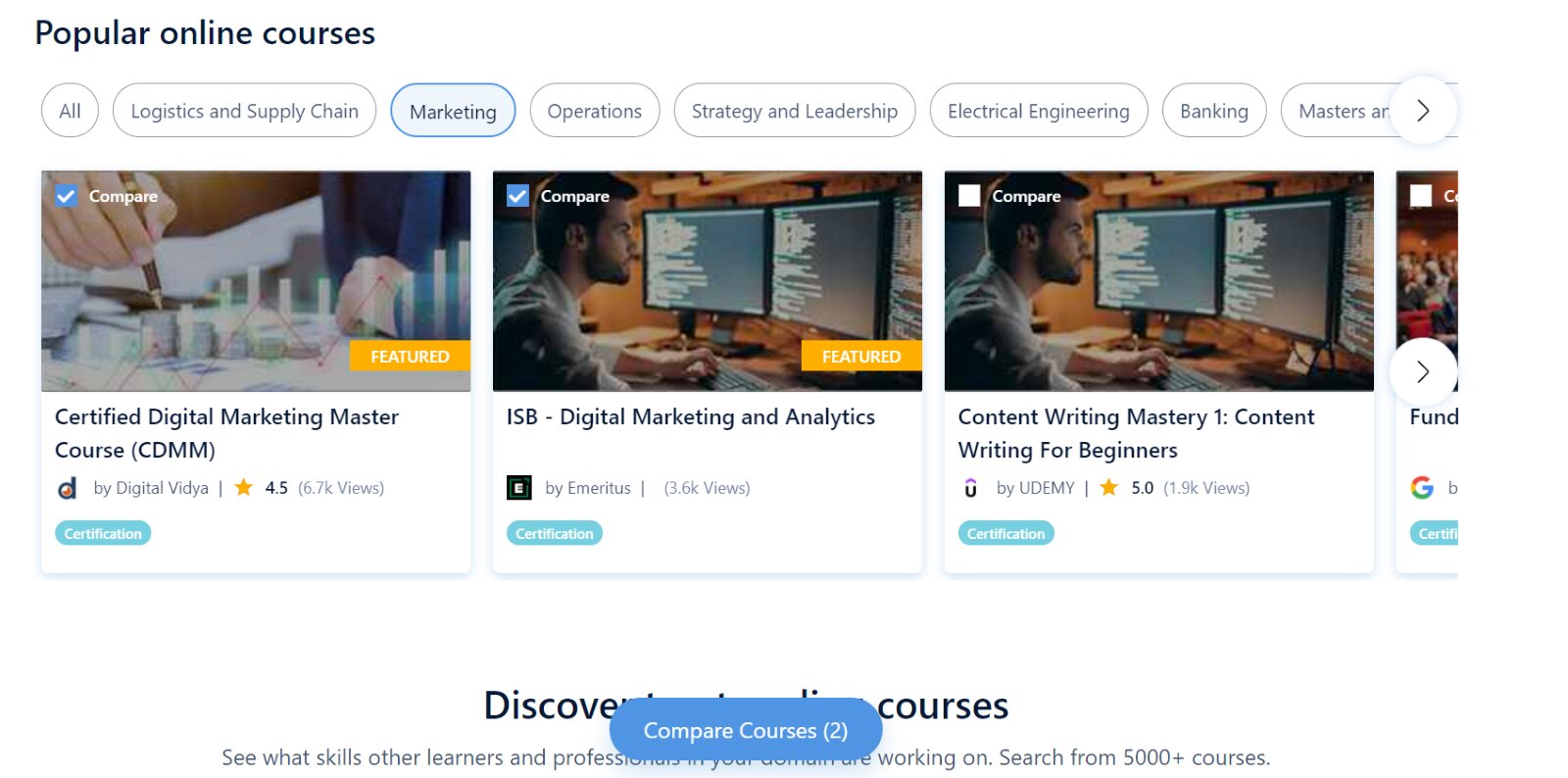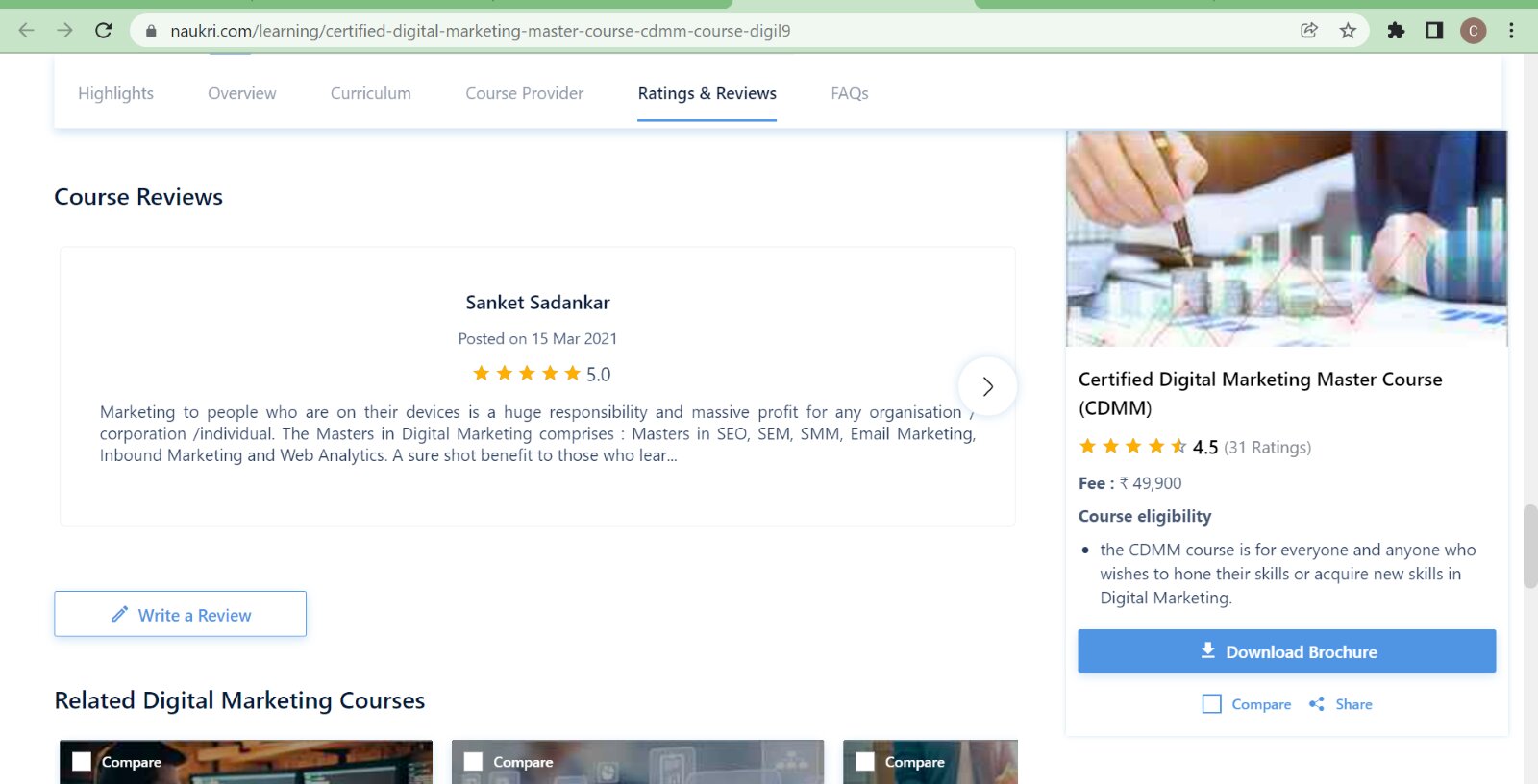How to choose an Online Course
Online courses are all the rage now. The pandemic made it necessary for us to go online for our basic needs, even education. It is proven that online learning is as effective as offline learning. With a ton of courses present online today, your problem is not whether you should take an online course, but which course to choose.
At Shiksha Online, we have a comprehensive course collection of more than 16000 courses from 70 different providers. We created this guide after understanding how learners approach the problem of choosing the right course. This guide will help you approach the problem in several steps and make a few recommendations.
Depending upon your purpose for doing the course – whether it is getting better with skill, starting a new career, or job transition, the entire process of choosing a course can be broken down into the following steps:
- Setting an attainable Goal
- Researching the key skills
- Deciding the time commitment
- Setting a budget for online courses
- Choosing the best learning platform
- Reading the reviews- thoroughly
- Evaluating the course content
- Picking the best instructor
Set an attainable goal
The first step is to identify the purpose of doing the course. Depending on your life and career stage, you might fall into either of these categories –
- You are in college and looking at different courses that might be relevant to you
- You want to switch to a new domain
- You are looking to upskill yourself in the domain you are working in
- You are just exploring different courses for the sake of learning.
You can write down in a sentence or two what your immediate goal is. The next step would be more straightforward if you can define a clear goal. It would look something like
- “I want to make a career switch to Product Management in 6 months.”
- “I want to learn Web Development and get a Front-End Developer job in 3 months.”
- “I want to start a career in Psychology in the next 4 months.”
- “I want to get a degree in Digital Marketing and work in this domain in the next 1.5 years.”
Regardless of your aspirations, you are more likely to finish a course if you can bring definitiveness to your goals. Goals that you’d create with a time frame in mind are likely to get completed. You can then choose a course you can finish in that particular time frame.
If you struggle to define your goal clearly, you can get help from your seniors, friends, and family. You can look at a few profiles of people on LinkedIn who are working in the industry of your interest at senior levels. Dropping a small message on the platform is all it takes to get guidance from anyone now.
At Shiksha Online, we have courses in all possible domains. You can also search for a course directly from the search bar.
Best-suited Business & Management Studies courses for you
Learn Business & Management Studies with these high-rated online courses
Research Key Skills
It is essential to understand the most in-demand skills in the industry to succeed. Let us say that you want to build a career in Data Science. You need to understand the trending skills in Data Science that are high-paying and relevant. Since industry requirements change quickly with time, staying relevant requires you to have first-hand insights into the industry in which you aspire to work or are currently working.
You need to assess what doors might open for you when you pick up a particular skill. Should you pick up Python or Node JS? Will you get a higher salary if you learn SEO or SEM? These contextual questions need to be answered well before.
On Shiksha Online, when you search for a domain (Data Entry in this example), you can see how the demand for an individual skill (Excel) varies over time:
Depending on your current expertise, you might naturally want to learn the skills you think will help you get a job. But will that give you a good ROI(Return on Investment)? That’s a question that requires more profound research. This tool will show how the demand for different skills in any industry has changed over time.
You can narrow your search to one or two critical skills per industry. The next crucial question would be how much time you can spare to do an online course, which will determine your course type.
Decide on the time commitment
One of the biggest advantages of online learning is its flexibility. You can take a course anywhere and at any time.
Today, courses can be between 2 hours (for short, topic-specific courses) and 2 years (for longer-duration degree courses). Evaluating how much time you can commit per week is directly related to goal achievement and success.
If you are working 12 hours a day, attending classes daily, and coming back home, taking a course that will require 10-12 hours per week might not be a good choice. Some courses allow you to complete everything in 5 weeks but need a couple of hours of your time every week. You should aim to take courses that fulfill your needs in the minimum time. Although, note that advanced-level courses in any domain require a lot of time commitment.
You are most likely to finish small topic-driven courses easily. You can also look at degree courses whose classes are run on weekends. Ideally, you should target courses that require 2-4 hours of commitment every week if you have other engagements.
Learners who procrastinate are more likely to succeed if they do guide courses. These courses require you to finish several modules and assignments every week. Platforms like Coursera ask you how much time you can spare every week at the beginning of the course. It ensures you don’t fall behind your commitments and stay on track to complete the course.
You can filter your search results to exclude courses on our platform. These filters will help you find all relevant courses based on your criteria.
You need to choose a course you think you’ll have the time to finish easily. Picking up short courses, in the beginning, isn’t a bad idea. You can also pick up relevant parts of a course instead of choosing to do the entire course if your aim is upskilling and not getting a completion certificate. It will save you a lot of time. If you don’t fall under this category, we suggest that you start small and assess how much time you can give to online courses. You can plan on taking courses that require more commitment in the future on this basis.
Experimenting in this way would help you save a lot of money. Now, you will invest money in those courses you are convinced you can finish, which brings us to the next part.
Setting a budget
Online Courses are available in all price ranges. There are a lot of free courses online, but only a few of them provide value. It is a natural tendency to collect cheap and free courses thinking that you can do them later. You can collect many of these courses, but the odds are that you’ll never touch them because they were bought with no goal in mind.
A course being costlier because of its length isn’t a good justification for its price. Learners are willing to shell out extra money just because a course lasts for 8 weeks for courses that would take 4 weeks to finish. Suppose the value created by the course is according to what it promises. In that case, the instructor taking the course is good and it tackles a specific topic comprehensively, only then is the price of the course justified. Course reviews will help you assess all of this.
Subscription models are slowly becoming the norm. Platforms with a subscription model provide access to many short courses. A subscription might seem costly, but if you are an enthusiastic learner, it makes more sense than buying individual courses. This works best for people who are looking to upskill themselves without a specific goal in mind.
If you pick up a course with a higher cost, the peer group would usually be better. This is because cheaper courses tend to attract learners who are not the intended target audience. Peer learning would be much better in such courses. These courses might also have 1 on 1 mentoring and placement support as well.
You can filter out courses on Shiksha Online based on program type and a particular price range. You will also get an option to show only free courses.
- Degree courses and diplomas are comprehensive, but they are expensive as well. These courses will make you an expert in the field and often offer career support. They come in varying price ranges.
- Certification courses add more value to the CV, and their price varies.
- University Credit courses are offered by NPTEL and Swayam. Under the Swayam Act of 2016, these courses can be treated like credit courses. They can be transferred onto students' academic records and are free of cost.
Depending on your goals, you can select any of these courses.
Choose the best Learning Platform
Every online learning platform has something unique to offer. Each one today operates in different niches. The choice of which online learning platform to choose would depend upon your exact goal and the domain you must upskill in.
Here’s an example. Let’s say you want to switch your career from IT Operations to IT software. Your first step is to understand what the learning path would look like. You will need to gain multiple skills. Then, you will search for courses catering to each skill. You will have to evaluate the overall time commitment as well.
This process would take out a considerable chunk of your time. An alternative to this would be to choose a platform that has a feature for course collections based on career paths – like Coursera. Degree programs are a viable alternative as well. Platforms like Udacity offer Nanodegree programs, or you can also choose a degree course from Upgrad. These courses come with personal mentoring sessions as well.
For this particular example, Udemy or Skillshare won’t be able to give you much value. A prospective recruiter won’t be able to judge your course certificate based on courses from unknown providers on Udemy. For a career transition, you will need many new skills – one course might not be sufficient.
One more question that should be addressed here is this: Can YouTube courses substitute for courses from other platforms? YouTube has become a great learning platform. What makes it suitable is that all courses are free. But there are caveats.
If your sole purpose is to understand a topic you have learned elsewhere but couldn’t grasp, or you need a quick reckoner, YouTube is enough. Short, quick lessons and the ability to navigate to any particular video make it great for this purpose. You get a lot of different videos addressing a specific topic on YouTube as well. But there are challenges if you choose to do a complete course on YouTube.
- You won’t get a certification at the end of the course.
- There are no assignments that have to be completed. Unless you are learning and doing, you might not be able to master concepts requiring more practice.
- Lack of proper nudges at different points of time, like for finishing weekly tasks and reminders to complete weekly commitments
- The authenticity of the content remains an issue since not all educators have the right credentials. Beginners might not be able to tell whether the content is authentic.
Some platforms are suitable for a few domains. For example, Udacity is an excellent platform for technology-related courses. It is great for beginners, and its design is pretty simple. Coursera won’t have many options in the personal development space, and NPTEL would seem most relevant to engineering students looking for university credits.
You can look at different course providers on Shiksha Online by navigating the course providers dropdown.
You’d probably choose the same platform for upskilling again and again once you like one. So, zeroing in on the best platform would require evaluating your short-term and long-term needs.
We also have a course comparison feature. You can select up to 4 different courses, compare them, and choose the best.
Read the reviews– thoroughly
A detailed review of an online course would tell you a lot about it. Often, numerical ratings won’t give you an entire picture.
In a review, you can consider the following points –
- Were learners able to achieve their own end goal with this course?
Learners must have picked the course keeping a specific goal in their mind. Were they able to achieve their personal goals after finishing this course? Did the course deliver on what it promised?
- Is this course relevant for everyone, or are there prerequisites?
Some courses might claim to be beginner-level, but when the course starts, learners struggle due to a lack of background. If the course has some prerequisites, you will get to know them. You should choose that course after tackling the prerequisites.
- Does the course need more time commitment than it claims?
Since all learners have different speeds at which they learn, not everyone would’ve been able to complete the course in the same time period. You can get an estimate of how long the course takes to complete by reading multiple reviews.
- Is the teaching methodology of the course interesting?
- Is there enough interaction with the instructors or between learners?
- Is there any career support being provided on the course?
A few course providers provide career support, which entails one-on-one sessions with mentors, general aptitude training, etc. You should get a rough idea of how this support is provided.
Depending on the type of course you have chosen, there can be additional considerations. Still, these broad questions should be able to tell you if the course delivers according to set expectations.
On Shiksha Online, you can read detailed reviews of individual courses, which can help you choose the best one.
Evaluate the Course Content
You need to review the entire course syllabus and understand if it has the latest content and covers the requisite topics comprehensively,
There are courses with great content out there. Some courses are just class recordings, and some of them are guided with live instructions. In any case, the course should be designed in such a way that it is suitable for online teaching. It is known that courses made specifically for online learning have better learner engagement than those that have been made for offline learning but recorded for online consumption. You can look at one or 2 videos that have been provided for free viewing in a course and assess whether that is the case.
Ideally, a course should have enough resources to allow learners to read the relevant text and watch videos. Reading and video teaching should work together. Some learners like to delve deep into a topic, while others just watch video recordings. Depending on your suitability, you now have more than one way to learn about a concept.
When reviewing course content, you should always look for something that gives you practical exposure, like projects. These will help you hone your skills better and showcase them to a prospective recruiter. Even if you don’t want to, you will still gain a greater understanding.
For example, if you want to learn Full Stack Development, your course should cover front-end, back-end, and concepts like REST and SQL. You should choose a course that covers the trending skills in this domain and gives you some practical projects. You can make a Github account and showcase your projects to recruiters.
We have created course guides that you can refer to when choosing courses. You can check them out in our blogs section.
Pick the best Instructor
Everyone claims to be an expert in his/her field. With the open web, anyone can create courses. Whether that course is good for you or not is difficult to assess.
One factor that determines the effectiveness of a course is its goal. Courses that tackle very specific topics and are oriented towards the instructor's expertise can offer maximum value.
Now, this doesn’t always mean you will assess the instructor based on his/her qualifications. Many instructors might not have a Ph.D. in that particular domain, but they are good at teaching. Sites like Skillshare are full of courses provided by non-trained experts, but they are good at instruction. Most of the instructors on YouTube are taught by people who don’t have expertise in their field.
Some course instructors are not very comfortable in an online setup. They might be excellent in an offline setup but they struggle teaching online. Learners might have difficulty keeping themselves engaged in such courses. Almost all courses have a few free videos for you to try out. If you like the instructor's teaching style, that course can work out for you.
Detailed reviews of the course will give you an idea of whether learners could relate to the instructor's teaching style. But not everyone can be taught in the same way. You need to assess what’s best for you.
Even though you are doing the course virtually, you should be able to derive maximum benefits from the course through your instructor. You should be able to reach out to them and participate in discussion forums to maximize peer learning. It is the responsibility of the instructors to make such discussions possible.
Conclusion
An online course might have many variables to consider. These variables should be considered properly and it should enable you to make your best upskilling decision. Your aim should be to fulfil the goal you have set for yourself, but in the long run, it is also important that you keep on coming back to upskilling yourself. Ultimately, all the points discussed should enable you to make a more informed decision.
We are dedicated to providing you with courses in Technology, Management, Data Science, Personal Development, and other domains and helping you choose the right course. You can browse our website, look at different courses, and find out what suits you best based on this guide.
This is a collection of insightful articles from domain experts in the fields of Cloud Computing, DevOps, AWS, Data Science, Machine Learning, AI, and Natural Language Processing. The range of topics caters to upski... Read Full Bio




